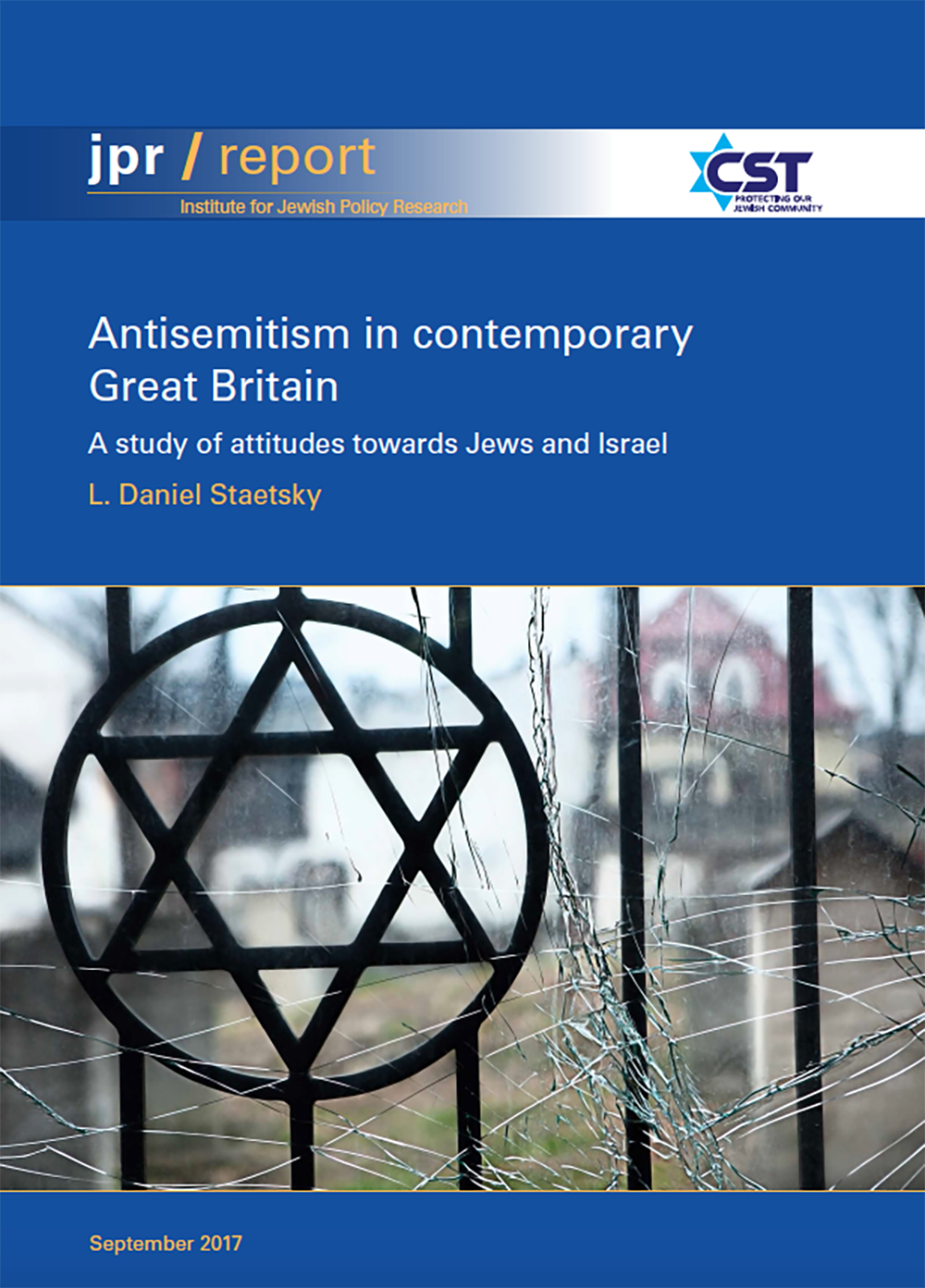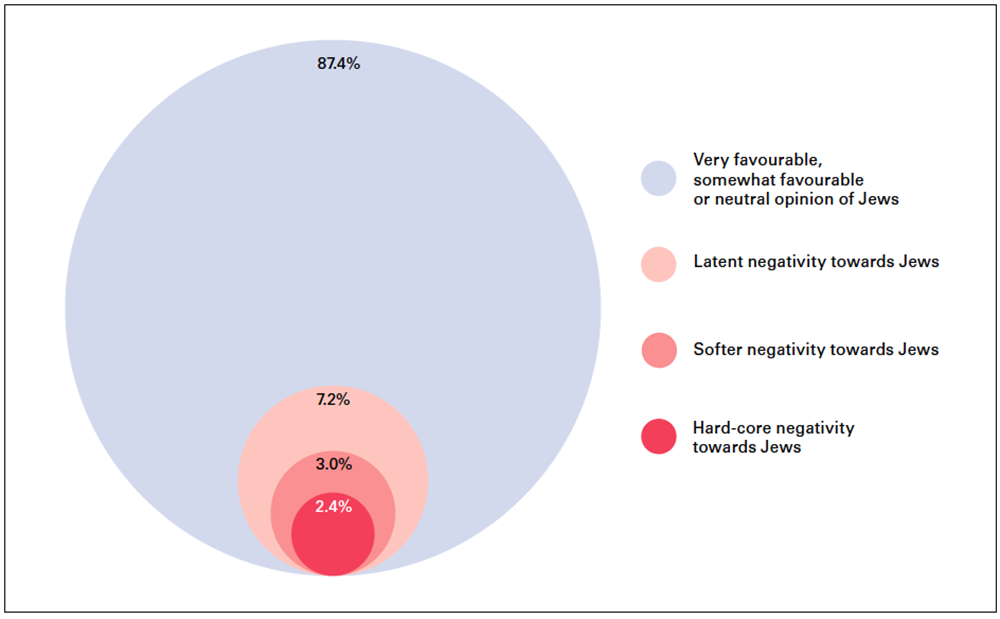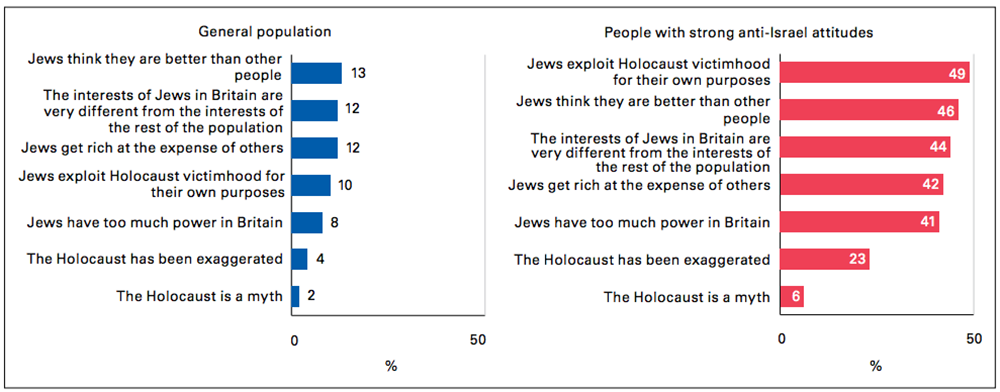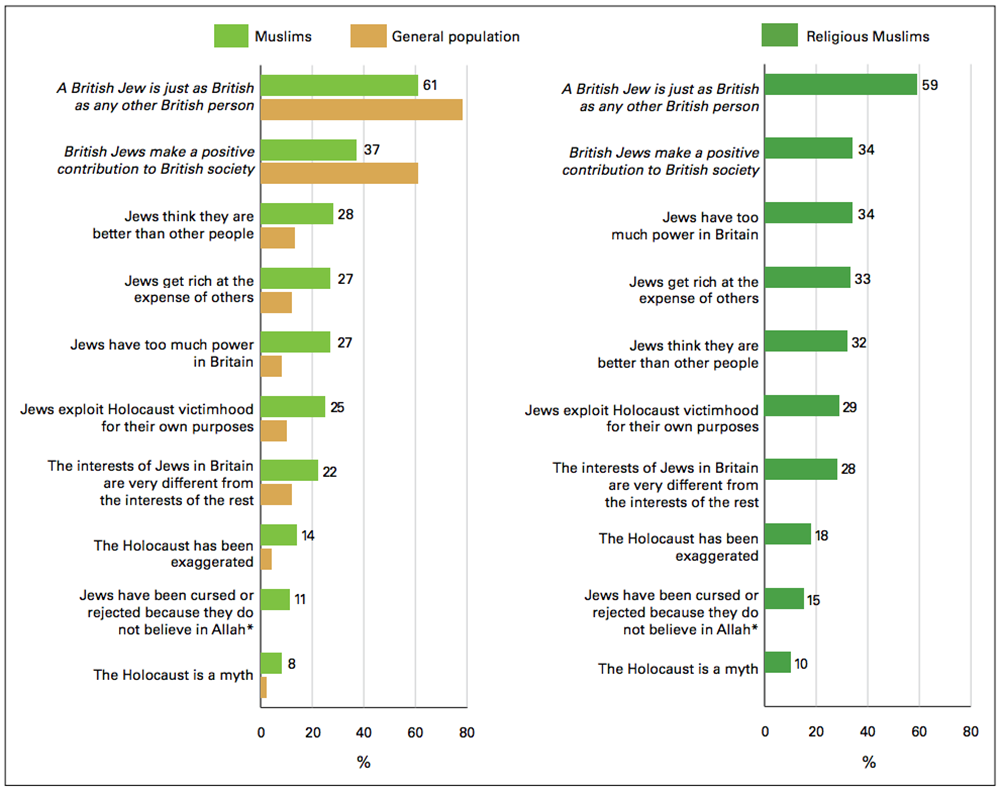CST Blog
CST and JPR produce major new study of antisemitism in Great Britain
12 September 2017
CST and the Institute for Jewish Policy Research (JPR) have produced a major new study of antisemitism that gives new insight and analysis about the extent of antisemitism in Great Britain. Two years in the planning, this is the largest and most detailed survey of attitudes towards Jews and Israel ever conducted in this country.
Titled Antisemitism in contemporary Great Britain: A study of attitudes towards Jews and Israel, the study provides a meticulously-researched and detailed assessment of the UK population’s opinions about Jews and Israel, and addresses the question of the relationship between antisemitism and anti-Israelism using statistical techniques for the first time. The report can be read here.

The ‘elastic view’
This report introduces a new way to understand the level of antisemitism in a society: the elastic view. Rather than try to pinpoint a single percentage figure to measure antisemitism, this new approach recognises that antisemitic attitudes can be held strongly or weakly, knowingly or unknowingly, and for different reasons. Some people may be strongly antisemitic, others less so; while others may hold certain negative attitudes or stereotypes about Jews without being consciously antisemitic. The elastic view of antisemitism accounts for these different levels of antisemitism across society.
In keeping with the elastic view, we draw a critical distinction between counting antisemites – i.e. people who are clearly antisemitic – and measuring antisemitism – i.e. negative or hostile assumptions and stereotypes about Jews that can reasonably be described as antisemitic ideas. The prevalence of antisemitic people is marginal in Great Britain; the prevalence of antisemitic ideas is rather more common.
Counting antisemites versus measuring antisemitism
The existence of strong, sophisticated, perhaps internally coherent and at times even ‘learned’ antisemitism, where open dislike of Jews is combined with developed negative ideas about Jews, does not exceed 2.4% of British adults. An additional 3% of people can be termed ‘softer’ antisemites, expressing fewer, but nonetheless multiple antisemitic attitudes, often couched in less certain terms. This relatively small group of about 5% of the general population can reasonably and justifiably be described as antisemites: people who hold a wide range of negative attitudes towards Jews.
However, because antisemitic ideas circulate in society well beyond this narrow group, there are many more people who believe or express a small number of negative ideas about Jews, but who may not be consciously hostile or prejudiced towards them. In total, about 30% of people agree with at least one of the antisemitic attitudes tested in this survey, half of whom agree with two or more such attitudes. This means that antisemitic ideas are not as marginal in Great Britain as some measures of antisemitism suggest, but it emphatically does not mean that 30% of the population is antisemitic or should be called antisemites. The motivations of those expressing such views may well be benign, and in many instances, they may not even realise that a particular comment or remark might be experienced by Jews as offensive, upsetting or simply uncomfortable. Nevertheless, Jewish people can (and do) encounter these views relatively frequently, which naturally affects their perceptions, sense of comfort and safety, and, ultimately, their quality of life.

Even so, levels of antisemitism in Great Britain are among the lowest in the world. British Jews constitute a religious and ethnic group that is seen overwhelmingly positively by an absolute majority: about 70% of people have a favourable opinion of Jews and do not entertain any antisemitic ideas or views at all.
Measures of anti-Israel individuals and ‘anti-Israelism’
The survey found that 12% of people in Britain hold multiple anti-Israel attitudes and could be described as having ‘hard-core’ negativity towards Israel. A further 21% have ‘softer’ negativity towards Israel. They endorse fewer, but nonetheless multiple, anti-Israel attitudes, often couched in less certain terms. Taken overall, a total of 56% of the general population hold at least one anti-Israel attitude. As with the equivalent measure of antisemitic attitudes, this does not mean that 56% of people are anti-Israel; rather, it captures the diffusion of anti-Israel ideas in British society.
This survey measured antisemitic attitudes and anti-Israel attitudes separately, then looked at how they could be correlated to demonstrate whether or not there is a relationship between them. It discovered that anti-Israel and antisemitic attitudes sometimes come together and sometimes don’t: but while there is no definitive answer, there is a pattern. The stronger a person’s anti-Israel views, the more likely they are to hold antisemitic attitudes as well: 74% of people who have strongly anti-Israel views also hold at least one antisemitic attitude (more than double the 30% of the population as a whole who hold at least one antisemitic attitude). Therefore, while it is not possible to say that a person who is strongly anti-Israel will also definitely be antisemitic – because many are not – it is possible to say that the probability of such a person being antisemitic is considerably higher than for a person who does not hold any anti-Israel views.
To the best of our knowledge, this is the first robust empirical documentation of the association between these two attitudes in Britain. It shows that the assertion that antisemitic and anti-Israel attitudes are unrelated (effectively, that people endorsing harsh critiques of Israel have absolutely nothing against Jews) is wrong; and maintaining that they are always related (that people endorsing harsh critiques of Israel are necessarily antisemitic) is also wrong.

The probability of violence
1% of British society believes that violence in defence of their religious or political beliefs and values is ‘often’ justified against Jews, and a further 3% believe that it is ‘sometimes’ justified. Almost identical results are reported for any justification of violence against Zionists and Israelis. Levels of justification for violence on similar grounds against Muslims are higher (7.5% ‘often’ and ‘sometimes’ combined). Against Islamist extremists, the equivalent figure is 27%. Against immigrants in general it is 7%, the same level as against banks or big business. Thus, the position of Jews based on this measure is the least threatened among all of the groups investigated.
Antisemitism and anti-Israelism among key religious and political sub-groups
Levels of antisemitism and anti-Israel attitudes among Christians, of whatever denomination and at whatever level of religiosity or practice, are largely in line with levels found in the population of Great Britain in general – neither higher nor lower. The Christian theological idea that Jews are cursed in some way because they do not believe in Christ still circulates among a small minority of Christians, but its current role in feeding antisemitic feelings and thoughts is unclear and probably minimal.
Levels of both antisemitism and anti-Israelism are consistently higher among the Muslim population of Great Britain than among the population in general. The presence of antisemitic and anti-Israel attitudes is 2 to 4 times higher among Muslims compared to the general population. Non-religious Muslims are the least likely group among all Muslims to hold antisemitic or anti-Israel attitudes, and come closest to the levels found in the general population, although they still remain above average. Yet most Muslims (60%) – religious or not – agree with the statement ‘A British Jew is just as British as any other person,’ and most either disagree with, or are neutral on, every one of the antisemitic statements presented to them.

The most antisemitic group on the political spectrum consists of those who identify as very right-wing: the presence of antisemitic attitudes in this group is 2 to 4 times higher compared to the general population (and similar to the levels found amongst Muslim respondents). The far right group is also more anti-Israel than the norm. Levels of antisemitism among those on the left-wing of the political spectrum, including the far-left, are indistinguishable from those found in the general population. Yet, all parts of those on the left of the political spectrum – including the ‘slightly left-of-centre,’ the ‘fairly left-wing’ and the ‘very left-wing’ – exhibit higher levels of anti-Israelism than average.
Although the prevalence of antisemitism on the far-right is considerably higher than on the left and in the political centre, the far-right remains marginal in British politics in general, as well as on the broader political right. So, whilst levels of antisemitism are significantly lower among the far-left than the far-right, the larger number of far-left people than far-right people in Britain means that the actual numbers antisemites in both groups are rather similar; as is the likelihood of Jews encountering them.
Even taken together, and allowing for the raised levels of antisemitism or anti-Israelism amongst the far right, far left and British Muslims, these groups are simply too small numerically to account for the overall spread of antisemitic attitudes across British society. If these groups exhibited the average level of antisemitism found in the population as a whole, rather than the raised levels found in this study, then the proportion of those who hold at least one antisemitic attitude in society as a whole would fall from 30% to 28%, an insignificant reduction. Similarly, the proportion of those holding multiple and intense antisemitic attitudes would only fall from 3.6% to 3.0%. Antisemitism in Britain today is about much more than simply what happens at the fringes of society.
Download 'Antisemitism in contemporary Great Britain: A study of attitudes towards Jews and Israel'.
Read More

Antisemitic Incidents Report January-June 2025
6 August 2025

CST Summer Lunch 2025
25 June 2025
CST Annual Dinner 2025
26 March 2025
